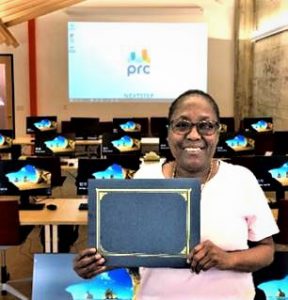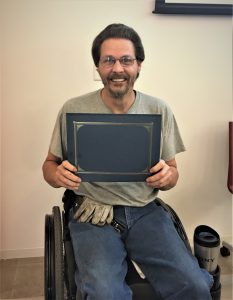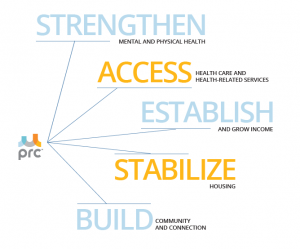Inside PRC’s buzzing 24-station Computer Learning Center, more than 100 people like Marilyn, Kim, and Sam are building digital literacy and skills to grow their income and workforce engagement.
“I’m so excited to move forward and into the workforce again.”
Outdated skills and gaps in employment can be hard to face, so PRC Workforce Development offers skill and community building opportunities that get people trained-up, confident, and back on their feet. Two accredited programs—Next Step Computer Training and Step Up Administrative Training—provide 64 combined hours of digital literacy and office skills readying people with mental and physical health disabilities for competitive internships and employment opportunities. Last year, PRC ran 20 cycles graduating 106 trainees!
“I have a better grasp on how this [technology] works…finally.”
The results speak for themselves. In 2019, employed graduates saw their annual incomes increase 337%.
People with disabilities experience three times the unemployment rate of the general population. But PRC is getting people into the workforce at more than double the statewide rate. When PRC opened the Integrated Service Center’s doors in April 2019, our computer lab’s capacity more than doubled, and the Workforce Development team began to ramp up classes, programs, and skill building opportunities. In less than one year, with the same high quality, high impact instruction, enrollment is up 30%.
“I can’t place a value on this experience. It was motivational, personally uplifting, and I learned so much in such a short time.”

PRC also launched LIFT UP SF – Lifting Up Peers for a Brighter Tomorrow – a 64-hour curriculum putting real life experience with mental health and substance use services to work for graduates as peer professionals across public health and social service fields. The first cohort just entered paid traineeships, the final step in advance of competitive employment placements at PRC and partner health agencies across San Francisco. The second cohort is double in size, with 15 students gaining competencies to put their lived experience to work advancing community health.

For graduates like Phil (not pictured), opportunities like Next Step, Step Up, and LIFT UP SF are transformational. A longtime PRC client, Phil has overcome drug addiction and homelessness. Fifteen years ago, when he was newly diagnosed with HIV, Phil accessed PRC’s legal services to secure disability benefits. Most recently he’s moving forward with PRC workforce development. “I feel really good right now in my recovery; I’m mentally stable and poised to be able to go off of disability [benefits] and back into the workforce…But the highlight of [LIFT UP SF] is the overall realization that my life experience is worth something. I can connect with that person going down a certain path…help people who are drug addicted, homeless, and in health crisis to get from that place—from where I was stuck—to where I am now.”
“My objective is to find a place where I’m happy and a place to grow”
On top of skills-based training and practice in the lab, clients work with PRC specialists to accessed tailored supports in resume and cover letter writing, skills inventories, vocational assessments, interview preparation, and post-placement counseling. PRC partners with some of the largest employers in San Francisco including the University of California at San Francisco, the City and County of San Francisco, the State of California, Apple, Genentech, Target, H+R Block, Starbucks, Blue Apron, Hyatt, Genentech, Uber, Alaska Airlines, Salesforce, Apple, Old Navy, and Whole Foods. The average wage of clients placed in employment was $20.66 per hour in 2018, 38% higher than the local minimum wage.
Congratulations to all our participants and graduates! We’re proud to stand with you, moving forward.
Learn more about PRC’s Workforce Development trainings and services here or reach out about hiring partnerships and putting graduates to work for you.


